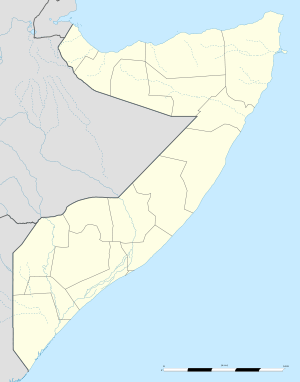2020 Afgooye bombing
On January 18, 2020, a suicide car bombing killed four and injured at least 20 others in Afgooye, approximately 30 kilometres (19 mi) from the Somali capital, Mogadishu.[1] Most of the casualties were police officers protecting Turkish contractors building a road.[2] The al-Qaeda-linked extremist group, al-Shabaab claimed responsibility for the attack.[2][3]
| 2020 Afgooye bombing | |
|---|---|
| Part of the Somali Civil War (2009–present) | |
 Afgoye Afgoye (Somalia) | |
| Location | Afgooye, Lower Shabelle, Somalia |
| Date | 18 January 2020 |
Attack type | Suicide car bombing |
| Weapons | Car bomb |
| Deaths | 4 (+1 suicide bomber) |
| Injured | 20 |
Background
Al-Shabaab began as the armed wing[4] of the Islamic Courts Union (ICU), which later splintered into several smaller factions after its defeat in 2006 by Somalia's Transitional Federal Government (TFG) and the TFG's Ethiopian military allies. [5]
The group often carries out attacks in Somalia, especially in and around Mogadishu.[3] It less frequently attacks other African countries which support Somalia, especially neighbouring Kenya. Al-Shabaab carries out attacks to try to undermine Somalia's central government, which is backed by the United Nations and African Union peacekeeping troops, (AMISOM).[6] On 14 October 2017, the worst attack by the organization killed more than 500 people with two bomb explosions that targeted Somalia's capital city Mogadishu.[7]
Turkish involvement in Somalia
Turkey is a large donor of humanitarian aid and reconstruction to Somalia.[8] Turkey maintained an embassy in Mogadishu, Somalia's capital, until the outbreak of the Somali Civil War in 1991.[9] During the drought of 2011, Turkey contributed over $201 million to the humanitarian relief efforts in the impacted parts of Somalia.[10] Turkey assisted in the building of several hospitals, and helped renovate and rehabilitate the Aden Adde International Airport and the National Assembly building, among other initiatives.[11]
Attack
Al-Shabaab militants detonated a car bomb near Afgooye, which is in Lower Shabelle and is approximately 30 kilometres (19 mi) from Mogadishu.[1] A Somali Police commander said the intended target was Turkish construction workers.[3] The suicide bomber sped into an area where the engineers and police were having lunch.[6] Local witnesses described a "massive explosion" and "clouds of smoke". [1] The casualties were mostly police officers providing security.[3] Following the attack, al-Shabab issued a statement, "We are behind the martyrdom of the suicide car bomb in Afgoye".[6]
Reactions
The Turkish defense ministry wrote on Twitter: "We curse and condemn in the strongest terms the bomb terror attack which targeted innocent civilians in Somalia".[6]
References
- "Somalia: Turkish workers wounded in deadly al-Shabab car bombing". Al Jazeera. 18 January 2020. Retrieved 18 January 2020.
- Guled, Abdi (18 January 2020). "At least 2 killed, 20 wounded in bombing near Somali capital". AP News. Retrieved 22 January 2020.
- "Al-Shabab Claims Responsibility For Suicide Car Bombing In Somalia". Forces Network. 18 January 2020.
- "'So Much to Fear' | War Crimes and the Devastation of Somalia". Human Rights Watch. 8 December 2008. Retrieved 9 June 2018.
- Abdisaid M. Ali 2008, "The Al-Shabaab Al-Mujahidiin: A profile of the first Somali terrorist organisation", Institut für Strategie Politik Sicherheits und Wirtschaftsberatung (ISPSW), Berlin, Germany, June. Retrieved on 26 August 2008.
- Sheikh, Abdi (18 January 2020). "Car bomb attack wounds Turkish contractors, police near Somali capital". Reuters.
- "Death toll from Somalia truck bomb in October now at 512: probe committee". Reuters. 30 November 2017.
- "Al-Shabab claims deadly attack in Somalia's Mogadishu". Al Jazeera. 30 December 2019.
- "Embassy of the Somali Federal Republic in Ankara". Embassy of the Somali Federal Republic in Ankara. Archived from the original on 20 August 2013. Retrieved 12 August 2013.
- "Turkey raises $201 million for Somalia". Hurriyet. 26 August 2011.
- Why Turkish aid model is proving to be a success in Somalia and elsewhere, Rasna Warah, Saturday Nation, 1 April 2012.